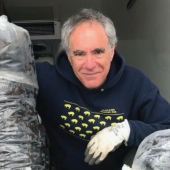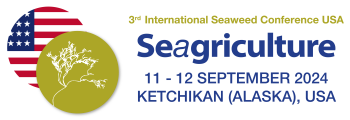
Recycled carbon fiber cable for seaweed cultivation - economic and financial benefits
Jon Kroman, Principal, Blue Dot Sea Farms, SPC, USA

Speaker
11 - 12 September 2024
Ketchikan, Alaska, USA

Recycled carbon fiber cable for seaweed cultivation - economic and financial benefits
Jon Kroman, Principal, Blue Dot Sea Farms, SPC, USA
About speaker:
Aside from his ownership in two seaweed ventures, Jon was a business lawyer and consultant for over 35 years, including for new and growing businesses. Since 2004, his work has focused on sustainability and included legal or consulting engagements for The Nature Conservancy, other nonprofit organizations, and a variety of mission-driven businesses. He has been an angel investor as a former member of E8, an investment community focused on clean technology. Jon has volunteered as a board member or advisor to numerous organizations involved in sustainability, including Washington Clean Technology Alliance (co-founder), Seattle Climate Partnership, and Washington Lawyers for a Sustainable Future. He has been a volunteer scuba diver at the Seattle Aquarium for over 15 years and PADI scuba instructor.
Company:
Blue Dot Sea Farms. SPC owns and operates a combined shellfish and seaweed farm on the Hood Canal in Washington State. The company also established Blue Dot Kitchen to develop and market consumer food products made with seaweed, the first being "Seacharrones" ™.
Presentation:
Recycled carbon fiber (RCF) comes from the huge waste streams generated in wind turbine and aircraft manufacturing. Compared to poly line, RCF cable can (1) provide greater yield per acre through increased planting density, (2) stay in the water and with a far longer useful life and enhanced. suitability for multiple crops more efficiently and effectively over the course of the year and (3) incorporate cleaning and harvesting devices to reduce labor cost and increase efficiency in farm operations in ways that poly line does not allow.

